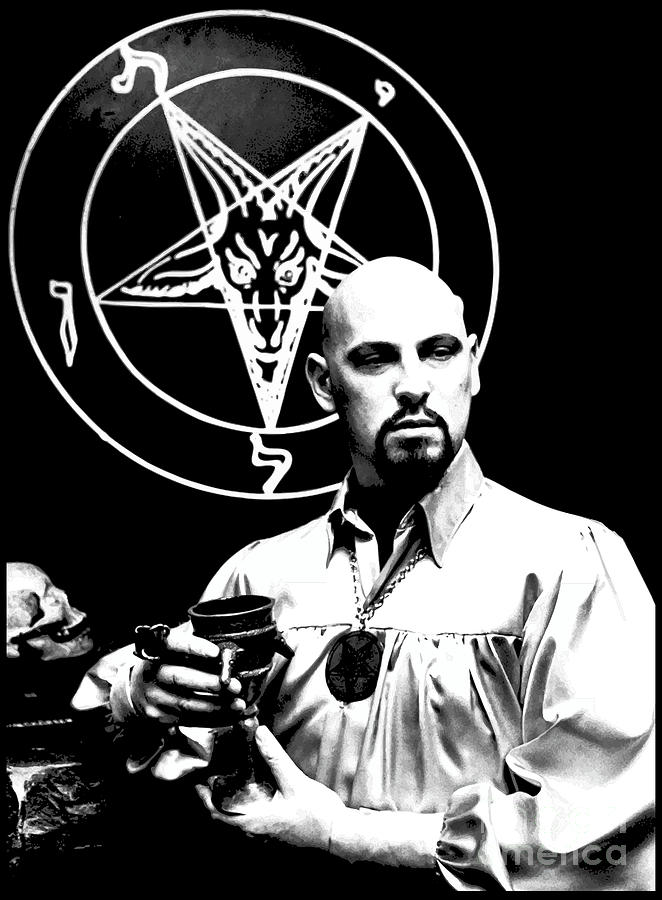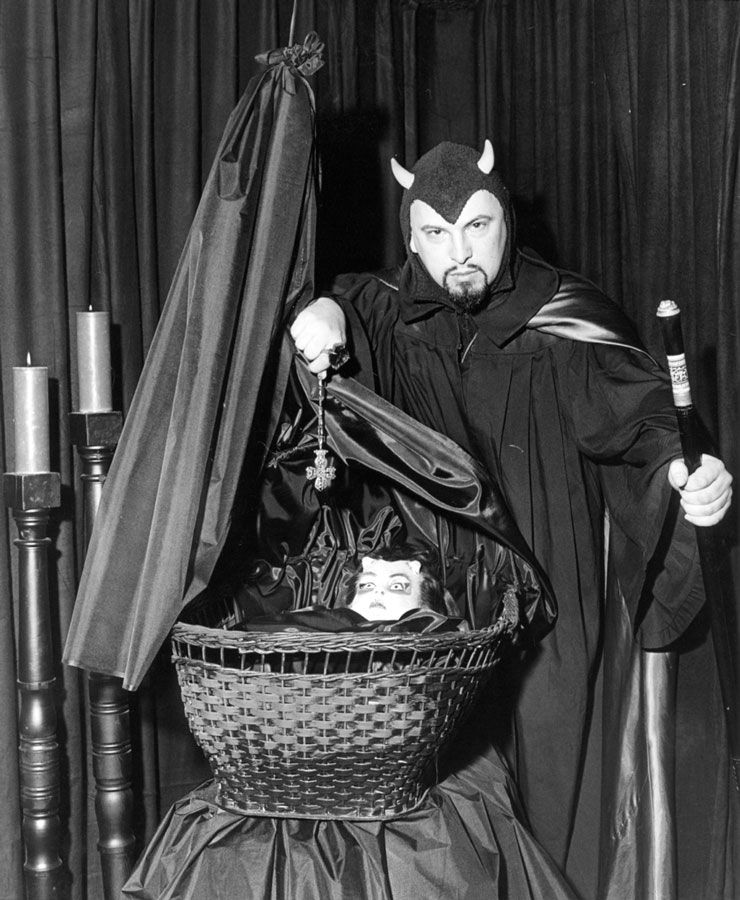Anton LaVey: The Man Who Redefined Satanism
When you hear the name Anton LaVey, it’s impossible not to think of the Church of Satan and the man who completely changed the perception of Satanism in modern society. LaVey wasn’t just some random figure; he was a cultural icon who dared to challenge religious norms and societal expectations. His influence is still felt today, long after his passing, and understanding his story is crucial for anyone interested in the evolution of alternative spiritual movements.
Anton LaVey burst onto the scene in 1966 when he founded the Church of Satan, an organization that became synonymous with his name. But who was this man behind the black robes and the public spectacle? LaVey wasn’t just about shock value; he was a philosopher, a musician, and a thinker who questioned the status quo. His work continues to inspire people worldwide, proving that his legacy lives on.
If you’re diving into the world of Satanism or alternative spirituality, understanding Anton LaVey’s contributions is essential. He didn’t just redefine Satanism—he redefined how people view religion as a whole. This article will explore his life, his philosophy, and the lasting impact he’s had on both believers and skeptics alike.
Read also:Rick Knudsen Today The Untold Journey Of A Man Who Shaped Modern Media
Table of Contents
- Biography of Anton LaVey
- Early Life and Influences
- Founding the Church of Satan
- LaVeyan Satanism Philosophy
- Satanic Rituals and Practices
- LaVey in the Media
- Criticism and Controversy
- The Legacy of Anton LaVey
- Books Written by Anton LaVey
- Anton LaVey’s Influence Today
Biography of Anton LaVey
Personal Information
Before we dive into the meat of Anton LaVey’s life, let’s take a quick look at his personal details. Here’s a breakdown of the man behind the myth:
| Full Name | Anton Szandor LaVey |
|---|---|
| Birth Date | April 11, 1930 |
| Death Date | October 29, 1997 |
| Place of Birth | Lebanon, Oregon, USA |
| Occupation | Founder of the Church of Satan, Author, Musician |
Anton Szandor LaVey was born in Lebanon, Oregon, and grew up in a world filled with music, mysticism, and a deep curiosity about human nature. His life was anything but ordinary, and his journey to becoming the founder of the Church of Satan was paved with experiences that shaped his worldview.
Early Life and Influences
LaVey’s early years were filled with a mix of influences that would later shape his philosophy. Growing up in a musical family, he became a skilled musician, playing the organ and piano. But it wasn’t just music that fascinated him; he was also drawn to the darker side of human nature, reading books on psychology, philosophy, and the occult.
As a teenager, LaVey worked in carnival sideshows, where he witnessed the extremes of human behavior. This exposure to the bizarre and the unusual left a lasting impression on him, fueling his interest in the darker aspects of life. He also worked as a photographer for the San Francisco Police Department, a job that gave him insight into the seedy underbelly of society.
These experiences, combined with his voracious appetite for knowledge, laid the groundwork for the man who would eventually challenge the religious norms of his time. LaVey wasn’t afraid to question authority, and his early life was a testament to his independent spirit.
Founding the Church of Satan
On Walpurgisnacht, April 30, 1966, Anton LaVey officially founded the Church of Satan in his home in San Francisco. This event marked the beginning of a movement that would challenge traditional religious beliefs and offer an alternative perspective on spirituality. The Church of Satan wasn’t about worshiping a literal devil; instead, it focused on human potential, individualism, and rejecting the dogma of traditional religions.
Read also:Best Ssh Remote Iot Device Raspberry Pi Free Unlocking The Power Of Pi
LaVey’s vision was simple yet revolutionary: embrace your inner nature, reject false piety, and live life on your own terms. The Church quickly gained notoriety, attracting media attention and controversy. It wasn’t long before LaVey became a household name, synonymous with Satanism and all its perceived taboos.
LaVeyan Satanism Philosophy
LaVeyan Satanism is rooted in the idea of individual empowerment and self-reliance. It rejects the notion of a supernatural devil and instead focuses on the earthly, tangible aspects of life. LaVey believed that people should embrace their desires, ambitions, and flaws without guilt or shame.
One of the core principles of LaVeyan Satanism is the Nine Satanic Statements, which outline the philosophy’s fundamental beliefs. These statements emphasize the importance of individualism, the rejection of herd mentality, and the celebration of life’s pleasures. LaVey also introduced the Eleven Rules of the Earth, a guide for living a fulfilling and ethical life without the need for divine intervention.
For LaVey, Satan was a symbol of rebellion against oppressive religious doctrines and a celebration of human nature in all its complexity. His philosophy continues to resonate with those who seek a more personal and secular approach to spirituality.
Satanic Rituals and Practices
Rituals in the Church of Satan
One of the most misunderstood aspects of Anton LaVey’s work is the practice of Satanic rituals. Contrary to popular belief, these rituals are not about blood sacrifices or evil acts; instead, they serve as psychological tools for personal transformation and empowerment.
- The Black Mass: Perhaps the most famous Satanic ritual, the Black Mass is a theatrical performance that parodies traditional Christian ceremonies. Its purpose is to challenge the dominance of Christianity and highlight the hypocrisy of organized religion.
- The Ritual of the Nine Angles: This ritual involves meditation and visualization techniques aimed at achieving personal goals and overcoming obstacles.
- The Ritual of Lust: Focused on sexual desire and attraction, this ritual encourages self-expression and the pursuit of pleasure without guilt.
These rituals are designed to help individuals confront their fears, desires, and ambitions in a controlled and meaningful way. They are not about evil but about self-discovery and empowerment.
LaVey in the Media
Anton LaVey’s rise to fame was partly due to his ability to capture the media’s attention. He was a master of public relations, using his charisma and controversial image to gain widespread exposure. From interviews to television appearances, LaVey was always ready with a quotable soundbite or a provocative statement.
His appearances in films and documentaries further cemented his status as a cultural icon. LaVey even played himself in several movies, showcasing his unique persona and adding to his mystique. The media’s fascination with him only fueled his popularity, making him a household name in the world of alternative spirituality.
Criticism and Controversy
As with any figure who challenges societal norms, Anton LaVey faced his fair share of criticism and controversy. Critics accused him of promoting immorality and encouraging dangerous behavior. Some even labeled him a fraud, claiming that his philosophy lacked substance.
However, LaVey’s supporters argue that his work was misunderstood. They see him as a revolutionary thinker who dared to question the status quo and offer an alternative to traditional religion. His emphasis on individualism and self-reliance resonated with many who felt alienated by mainstream spirituality.
Despite the criticism, LaVey remained steadfast in his beliefs, continuing to promote his philosophy until his death in 1997.
The Legacy of Anton LaVey
Anton LaVey’s legacy extends far beyond the Church of Satan. His ideas have influenced countless individuals and organizations, shaping the modern understanding of Satanism and alternative spirituality. LaVey’s emphasis on individual empowerment and self-reliance continues to inspire people worldwide, proving that his message remains relevant today.
His work has also paved the way for other thinkers and leaders in the alternative spirituality movement, encouraging them to challenge the boundaries of traditional religion. LaVey’s influence can be seen in various subcultures, from goth and metal music to modern pagan practices.
Books Written by Anton LaVey
LaVey’s contributions to literature are as significant as his philosophical work. His books remain essential reading for anyone interested in Satanism and alternative spirituality. Here are some of his most notable works:
- The Satanic Bible: First published in 1969, this book is the foundational text of LaVeyan Satanism, outlining its philosophy, rituals, and practices.
- The Satanic Rituals: Published in 1972, this book provides detailed descriptions of Satanic rituals and their psychological significance.
- The Devil’s Notebook: A collection of LaVey’s essays and writings, offering insight into his thoughts on various topics.
These books continue to be influential, providing readers with a deeper understanding of LaVey’s philosophy and its relevance to modern life.
Anton LaVey’s Influence Today
Even decades after his death, Anton LaVey’s influence is still felt in the world of alternative spirituality. The Church of Satan continues to thrive, attracting new members and promoting LaVey’s philosophy to a new generation. His ideas have also inspired various offshoots and interpretations, proving that his legacy lives on.
For those seeking a more personal and secular approach to spirituality, LaVey’s work offers a compelling alternative to traditional religion. His emphasis on individualism, self-reliance, and the celebration of human nature continues to resonate with people from all walks of life.
Conclusion
In conclusion, Anton LaVey was more than just the founder of the Church of Satan; he was a revolutionary thinker who dared to challenge the status quo. His philosophy of individual empowerment and self-reliance continues to inspire people worldwide, proving that his legacy remains relevant today.
If you’ve enjoyed this article, why not share it with your friends or leave a comment below? Let’s keep the conversation going and explore the fascinating world of alternative spirituality together. And if you’re interested in learning more about Anton LaVey and his philosophy, be sure to check out the books and resources mentioned throughout this article. After all, knowledge is power—and power is what LaVey was all about.


